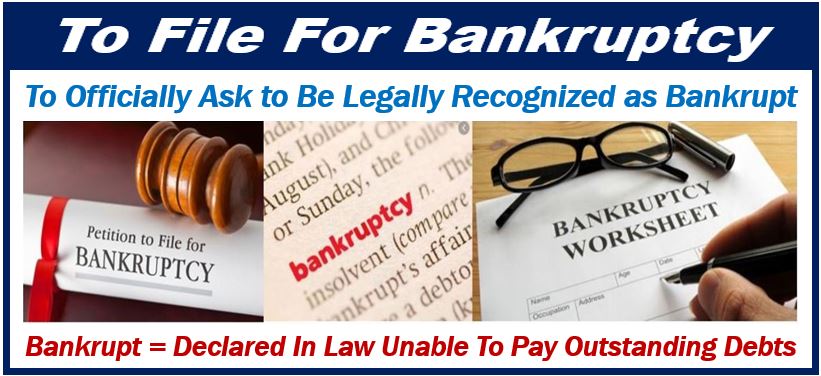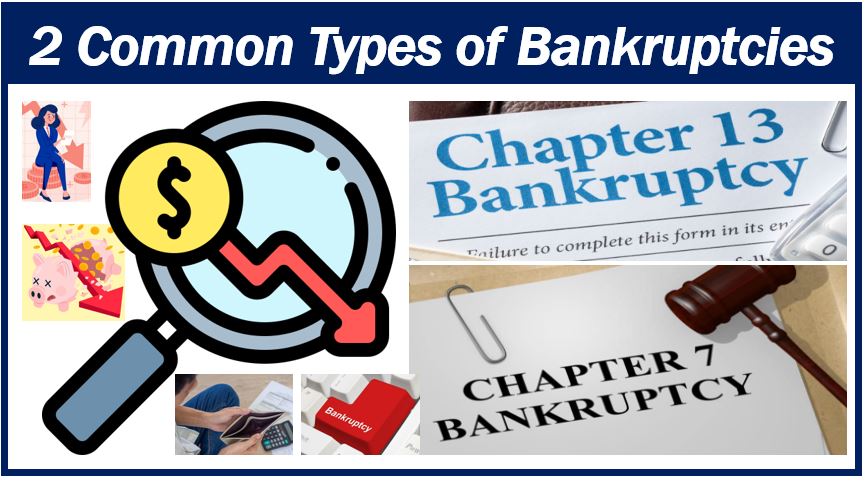Almost everyone at some point in time faces the problem of having bad debt. Having substantial debt, whether it’s from unemployment, health problems, divorce, or another personal issue, can be overwhelming and stressful.

If you have made attempts to make arrangements with creditors or have created a budget, but these efforts aren’t working, declaring bankruptcy may be your only option. No one wants to think about bad debt and bankruptcy, but if your financial problems have gotten out of control, filing for bankruptcy may help to eliminate most of your debts and give you an opportunity to start over.
However, there are some things to understand about bankruptcy that you may not be aware of, such as what debts bankruptcy clears and doesn’t clear. Here are some of the debts that bankruptcy will and will not clear away.
Bad Debts Cleared with Bankruptcy
In most situations, bankruptcy will clear most types of unsecured debt. Basically, the type of bad debt that isn’t a protected type of collateral, such as:
- Medical bills
- Credit card debt
- Utility bills
- Personal loans
- Overdue bills that have been submitted to collection agencies
- Business debts
Bad Debts Not Cleared with Bankruptcy

The main reason you are considering filing bankruptcy is to clear away your bad debts, the debts that you cannot pay. First, it’s important to keep in mind that there are different types of bankruptcy; the two most common types are Chapter 13 and Chapter 7.
Talking with a bankruptcy attorney will help you decide which option is the best for you and your circumstances; however, in either case, there are some instances where bankruptcy will not clear your debt, regardless of which type of bankruptcy you file. The most common debts that cannot be cleared with filing bankruptcy include:
Student Loans
Unfortunately, in most situations, you will not be able to clear your student loans through bankruptcy, because private and federal loans are exempt from bankruptcy. However, in some instances, you may be able to get your student loans discharged through bankruptcy. In order to clear a student loan, you will need to prove that you have suffered an undue hardship, such as a disability that prevents you from earning the money needed to repay the loan.
In this situation, you will also have to prove that you have done everything possible to pay down the student loans and that in doing so, it prevented you from maintaining the minimal standard of living. It is important to keep in mind that it is difficult to prove a hardship in bankruptcy court.
Secured Debt
Typically, any type of debt that has been secured with collateral, such as an automobile loan or your mortgage cannot be cleared by filing bankruptcy. The reason is that these items that you bought and are still paying on belong to the lender, so your only option is to give the items back to the lender or find a way to make payment arrangements.
Taxes and Government Debts
In rare cases, if there have been unpaid income taxes for at least three years prior to the bankruptcy filing date, the debt may be discharged. In most situations, taxes, like student loans aren’t typically going to be cleared.
However, there are some exceptions that may get them considered for discharge, but it requires you to complete an extremely complicated test to prove hardship and even if your income taxes are discharged, you are still liable for your sales or business-related taxes. Also, if you owe any debts to the U.S. government, such as fees, fines, or penalties, you are still responsible for payment.
Child Support and Spousal Support
Child support and spousal support payments will not be cleared with a bankruptcy. These payments are considered to be legal domestic support obligations as a part of your divorce proceedings, so they will not be considered in a bankruptcy claim.
Along with the support payments, if your divorce agreement states that you are responsible for your ex-spouse’s credit card debt, legal fees, or any other type of debt, these will not be eligible for discharge either.
Debt from New Credit Cards
Once you have filed for credit card bankruptcy, any new credit card debt you acquire cannot be claimed in the bankruptcy. This includes obtaining a new credit card and maxing it out or maxing out the credit card that has been included in the bankruptcy.
Forgotten Dischargeable Debts
If you have already filed the claim for bankruptcy, but discovered bad debts that you forgot about, they will not qualify for discharge. Once the claim has been filed you cannot go back and revise the list.
For this reason, it is extremely important that you are precise in going through your records to make sure you do not miss any legitimately dischargeable bad debts, including medical expenses and overdue bills that are in collections.
Debts for Malicious or Criminal Acts
If you owe money to the court system or individuals that were the victim of a criminal or malicious act, the debt cannot be cleared through bankruptcy. This includes fines, fees, or victim compensation from crimes such as false representation, embezzlement; fraud, or damages you owe to victims, such as if you were at fault for injuries from an automobile accident.
Final Thoughts
Although it’s not always possible to avoid substantial debt, the best scenario is to make all attempts to repay your debts and try to avoid filing bankruptcy. Some of the things you can do to take care of non-dischargeable debts or attempt to pay down your debts may include negotiating with creditors, selling your assets or property, create a tighter budget and seek financial help from family or friends.
It’s important to keep in mind that although a bankruptcy discharge does release you from most, if not all of your debt, following the bankruptcy, you will not be able to file again for several years, so getting on a manageable budget and practicing mindful spending will help you to avoid bad debts in the future.
Interesting related article: “What are Creditors?”

